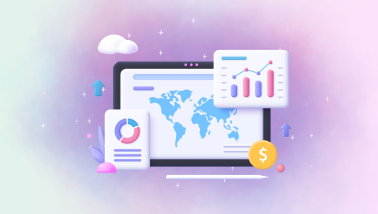Artificial intelligence (AI) as a marketing tool has been the new topic of conversation in marketing events this year. AI truly is a natural way to continue the discussion that marketing automation started, its core being targeted content, automatics, omnichannel and agile solutions.
Marketing automation has made many people take a look at all the things we do manually. At the same time, people have realized the immense possibilities data offers marketers and started to look for new kinds of solutions to utilize it outside of marketing automation tools.
Few of us have the time to dig through masses of data. A robot does.
What is AI?
Artificial intelligence is exactly what it sounds like: tasks that normally require a person are being performed with technology that simulates human intelligence. Depending on the purpose or the company, this could mean a complex technical business solution – or a chatbot with a funny name.
In fact, AI technology is used in many everyday marketing tasks. Marketers work with it through social media or media monitoring: for example, LianaMonitor's semantic monitoring is artificial intelligence. The monitor understands that an article is about a certain subject by looking at the entity, when previously monitors only concentrated on finding hits for the search terms the user had given. The marketer who spends time optimizing search engines also works with artificial intelligence.
Three types of artificial intelligence
The essence of artificial intelligence is by no means established completely and the terminology, and what AI ultimately even is, is still very much under debate. From a marketing point of view AI is generally divided into three different types: machine learning, applied propensity models and artificial intelligence applications.
Machine Learning
We talk about machine learning when models about probable actions based on previous data are created using algorithms. For instance, spam filters of email clients are machine learning: they alter constantly based on how the spammers' behavior changes.
Applied Propensity Models
This is the case when the models created through machine learning are utilized to predict the results of operations. Marketing scenario tools use applied propensity models to predict what marketing action will most likely produce the desired outcome.
Artificial Intelligence Applications
Artificial intelligence applications are applications that are programmed to complete certain tasks, such as produce text, gather data, or recognize images. These applications include the online store chatbot, the robot that is talking to you – very convincingly at that – instead of a customer service person. The “intelligence” of a robot that is repeating preprogrammed answers like a parrot can be argued, and the debate whether these applications can be classified as AI runs hot.
How does AI differ from marketing automation?
AI technology differs from marketing automation in the fact that in marketing automation the functions of the chains are designed by a human and implemented by automation. All learning and problem-solving is done by the human operating the system.
AI takes automation a step further, and makes decisions independently by combining data from different sources – and evolves constantly based on the new data. Marketers can control much more complex message chains with marketing automation than they manually could. AI in turn, at its most complex, combines data in ways that none of us have the memory capacity or time for. This enables infinite amount of variations – and even more detailed individual customer experiences.
However, it is unlikely that AI will replace marketing automation. Instead they are functions that support each other. Artificial intelligence is already utilized to improve the data management in marketing automation and AI will likely be an essential part of marketing automation systems. In the future, marketing automation management is probably more and more the problem-solving and developing cooperation of an artificially learning system and humanly evolving marketing professional.
What tasks are performed with AI technology?
Artificial intelligence doesn't replace people in the tasks that require most intellect but rather in the tasks that require the most routine. The most traditional AI applications are currently replacing the simplest marketing and customer service routine tasks like data search and duplication, and they help to scale a human's job.
The most typical ways to use artificial intelligence are:
Voice recognition
A growing number of searches are performed through voice recognition with a smartphone. This will not only bring challenges to search engine optimization in the future but also opportunities to climb higher in the search results by investing in voice recognition. Voice also offers an endless amount of possibilities for marketing and for smart online stores, for example – how would it feel to shop with a virtual shopping assistant or browse the recommendations of a webstore only with voice?
Chatbots
Artificial intelligence at its most typical form are customer service chatbots that learn to discuss certain topics with a customer through a chat. Creating a chatbot is not complicated – try to create a chatbot to your company's FB page following Facebook's instructions.
Searches
Artificial intelligence technology functions especially well in searches that contain a large amount of data but in which the questions are not completely specific. For example, you can already define by yourself which jackets come up in a search with certain filters, but in AI search the customer can ask “show me a nice ski jacket that is not pink and has a longer hemline” – in other words, things that you wouldn't have thought or wouldn't be meaningful to filter. Try for yourself if you find a jacket that's made for you from The North Face's experiment.
Text production
AI already helps to produce text quite well – not on Pulitzer level maybe, but often passable. Instead of replacing your bloggers with bots, you should start with texts that follow strict rules and that AI already reliably produces (and few people enjoy creating). These include different kinds of financial reports, sports results, hotel descriptions and stock exchange lists. Artificial intelligence also seems like the means for compressing and classifying large amounts of text.
Image recognition
Image recognition, that we regularly encounter on Facebook, Pinterest and now also on the newest iPhone, offers many practical applications for a marketer, starting from search functions (show me all the red coats) to recognition (show me what brand is the coat on the woman who is passing me). The channel doesn't play an important role: there are ready-made solutions for image recognition that you can build on in an online store, on mobile applications, as well as on websites.
Behavior-based predicting
Predicting will most likely become one of the most valuable AI functions for companies. Once it can be reliably predicted what customer behavior looks like right before someone is going to discontinue service, contact can be made at the right time. In addition, it is valuable information on what kind of customer contact intervals any given customer prefers and what kind of content should be shown to them on a website.
Display advertising
Even though it often feels that the simple "I looked at this bowl once, now it haunts me forever" retargeting chains are the most common type of display advertising, AdWords, PPC and CPC advertising already get a lot of data through artificial intelligence and the trend is on the rise. This not only helps a company to make its operations more targeted and cost-efficient, but also the consumers to receive more relevant messages.
Dynamic pricing
For some industries, like the hotel and travel industry, dynamic pricing has been business as usual for a long time: prices are determined according to demand and other factors. For example, flight comparison services show you different prices for different dates based on artificial intelligence – possibly even based on if you have looked at a flight, and definitely based on how many people have bought it or been about to buy it. It is also essential to show offers to those that are price critical and target discount codes that are tied to the number of purchases to the right group where there is most impact.
Liana Technologies continues its technology development to AI
Liana Technologies' LianaAI unit that was founded at the beginning of 2017 aims to offer marketers the possibilities to also utilize artificial intelligence applications in the future. Contact us if you want to continue the discussion with us!
Read also:
Liana Technologies joins the frontline AI research project of Aalto University.



